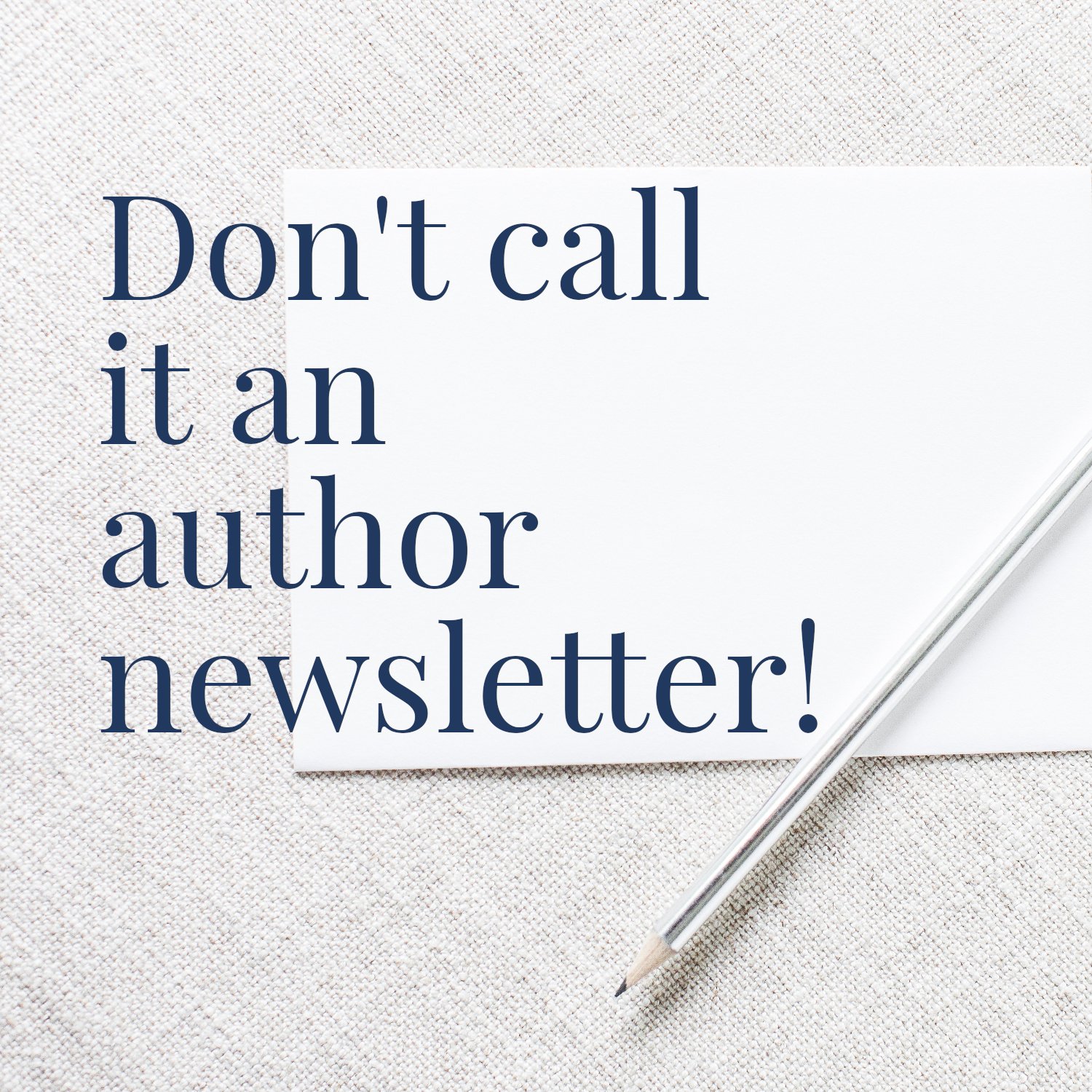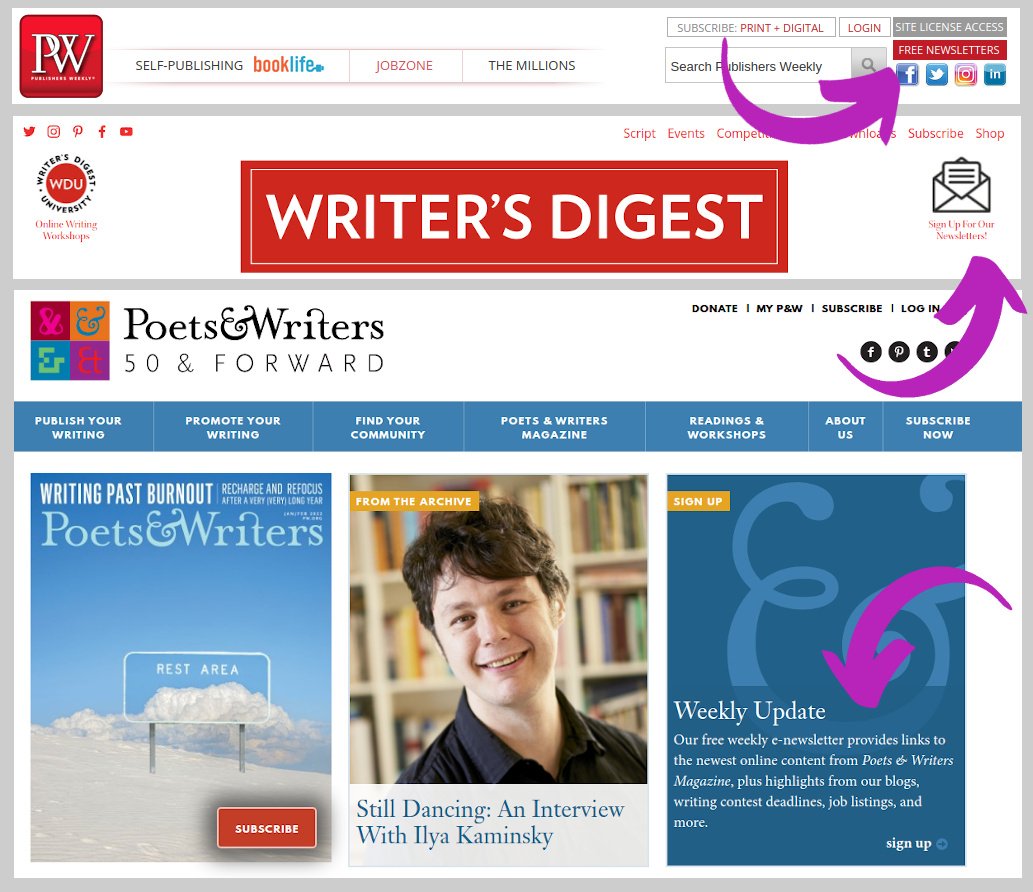Don’t Call It An Author Newsletter!
• This article contains affiliate links •
This article isn’t about what you do, it’s about what you call it
Names are important. Just as your book title is a vital choice in bringing your work to the world, other names matter too.
Today I have some firm advice that isn’t about what you do, it’s about the language you use for it.
And we’re talking about your email list.
Yes, you definitely need an author email list
There is firm evidence that authors need email lists. If anything, you need an email list slightly more than you need a website, and that’s a bold statement from someone who makes her living creating professional author sites!
Thousands of words have been written on this topic already, but I’ll remind you here briefly:
Social media is fickle. You don’t have any guaranteed right to continue to contact your audience there. Algorithms change fast and you can find, overnight, that a post that previously reached 1000 people for free now reaches 20 people, unless you pay to boost it.
Your website may be amazing, but, sadly, even if a reader visits and enjoys it, there is no guarantee they’ll be back.
When you ask for, and get, permission to email somebody, you have the right to send a message directly to their inbox, until they ask you to stop.
Unlike many of the tools you need in your writing and publishing career, you can start your author email list for free.
Regardless of your efforts to sell your current book, your email list may be your number one tactic to help you sell your next book.
So yes, authors should have email lists. And if you’re not yet published, it’s even better to get a little ahead with your author platform, by starting your email list now.
However, there’s one subtle but important trap that I see time and time again on author websites:
Don’t call it a “newsletter”
Some of the big names in the writing industry are still offering you a “newsletter”
When you ask for permission to keep in touch with your readers by sending email updates, it’s perfectly right that you tell them that they’re signing up to hear from you. Not only is that the legal and ethical thing to do, it makes sense.
However, in all the information you’ve read and heard about the importance of your author email list, you’ve been led into the trap of calling it your author newsletter.
“Newsletter” is an accepted shorthand in the direct email industry, and it’s a term used by thousands of marketing experts:
The phrase “author newsletter” returns about 128,000 search results on Google.
“Author email list,” on the other hand, shows just under 11,000 results : less than a tenth of the number of mentions.
The big email marketing companies like Mailchimp, Mailerlite, ConvertKit, AWeber and ActiveCampaign all have articles on how to get started with your “newsletter”.
Dozens of other brands that you interact with are calling their communications a “newsletter,” too.
The home page of Writer’s Digest contains a cute little icon, titled Sign up for our newsletters! The home page of Publishers Weekly is, frankly, a hot mess, but they too are touting Free Newsletters. Poets & Writers would like you to buy the magazine… but they’re also excited to entice you with their free weekly e-newsletter.
The problem comes when you turn around and write Sign up for my newsletter on your website.
This is more or less what you’ve been told to do, for the last dozen years at least, every time you’ve paid attention to book marketing advice. You’ve heard the message multiple times that you need to build your author platform, that part of it is an author newsletter, so that’s what you try to do.
But think about it for a moment:
Nobody wants more email!
If you were to have a friendly cup of coffee with a hundred ideal readers, how many of them would tell you that they love getting more email? How many would say they’re just dying to wade through more impersonal, promotional messages in their inbox? Very few.
“People are busy and NOBODY wants more email. ”
So in order for your audience and readers to take action on your request to sign up for your email list, you need to make it more enticing for them.
Ideally, offer something worth having, in exchange for their email address
You can brainstorm to your heart’s content here, and be inspired by other authors too. Good options that will help to grow your author email list include:
a free e-book
a few free short stories
a recipe collection (if your book appeals to foodies)
a quiz or puzzle PDF (if your genre is relevant)
an interactive quiz
a cheatsheet, checklist, how-to, or other guide (appropriate to your subject matter)
Don’t go over the top with what you offer, and do make it appealing for your ideal reader.
Example: to promote my series of romantic comedies set in England, my own freebies were 50 British Foods to Try Before You Die and 60 Things to Know Before Your First Trip to England. See them here.
For your own sanity, if you do offer a freebie (also known as a lead magnet or reader magnet), make sure it’s delivered automatically by your email list provider, when someone signs up. Even the free email plans usually let you send a single welcome message, and this is where you’ll link to the promised resource.
Even if you don’t have a lead magnet, call your “newsletter” something else!
All is not lost if you don’t (yet) have a juicy item to give away. You’ll still invite people to join your mailing list. Just don’t say Sign up for my author newsletter.
You’re a writer! Surely you can frame your communications in a more appealing way? For example:
Get insider updates
Be the first to hear about new books
Receive special offers and news of reader giveaways
Get notified about my upcoming releases and author events
Join my VIP club
… and so on.
“In its early incarnations, customers signed up for newsletters in droves to get access to promos sent directly to them by companies they favored – no trudging to the mailbox required. But now, nobody wants more email.”
You’re not misleading anyone, you’re simply making your “ask” more tempting
Reaching and retaining readers is hard
This change is an easy text edit and you can probably make it yourself, either on your author website, or by editing the form that your email list provider generated for you.
By using this approach to focus on the benefit to your reader, not the boost for your author platform, you'll develop a better understanding of what your audience wants, and see an improvement in the number of website visitors who sign up.
Plus, it’s an easy way to exercise your marketing muscles and get into the mindset of serving your reader, not simply pushing your own agenda.
Don’t forget to follow other best practice for your email list:
Get an account with an email list provider: they’ll help you stay legal in all kinds of ways, including managing unsubscribes for you.
Never blast your contacts by bcc’ing a note from your own email account. Don’t simply add your contacts to your author email list, either: ask friends if they want to hear from you in that context.
Add a privacy policy to your website, since this is required by law when you’re gathering information from visitors. Put the link in your website footer, so it’s visible from every page.
•
Are you ready to sell more books?
If you want an author website that delights your readers and sets you up for business results, let’s design, build, and launch your online home in just 2-3 weeks. Learn more, and then schedule a complimentary chat with me.
Other resources for supercharging your author email list
And for the essential steps in your website project, take a look at my free 50 Step Website Checklist.










